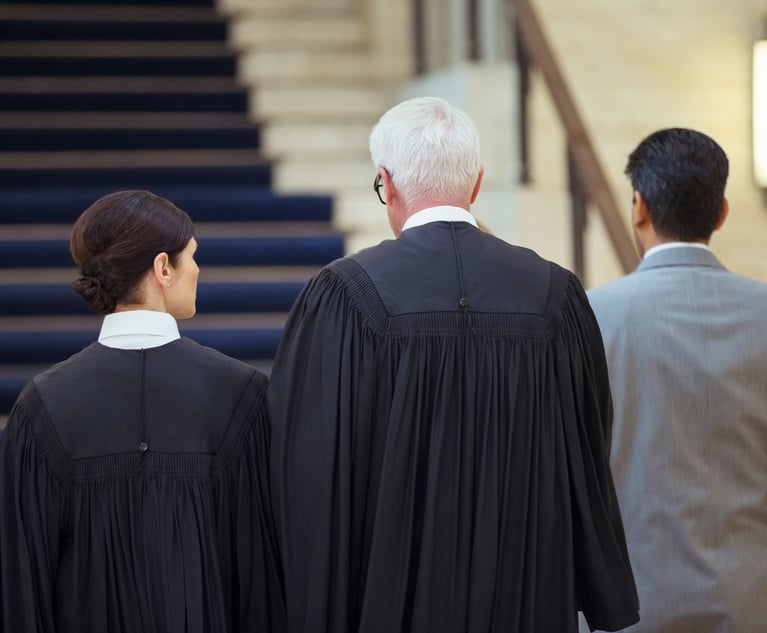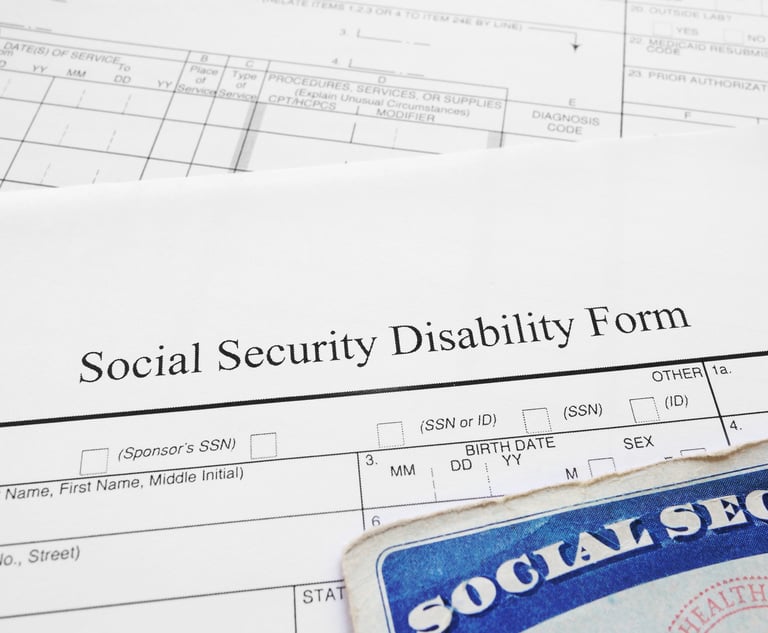Judicial Ethics Opinion 20-07
A judge with an interest in unpaid fees separately shared by the judge's former partner must disqualify in any matter where the former partner appears, for two years after final payment of those fees.
July 22, 2020 at 09:55 AM
4 minute read
The Advisory Committee on Judicial Ethics responds to written inquiries from New York state's approximately 3,600 judges and justices, as well as hundreds of judicial hearing officers, support magistrates, court attorney-referees, and judicial candidates (both judges and non-judges seeking election to judicial office). The committee interprets the Rules Governing Judicial Conduct (22 NYCRR Part 100) and, to the extent applicable, the Code of Judicial Conduct. The committee consists of 27 current and retired judges, and is co-chaired by former associate justice George D. Marlow of the Appellate Division and the Honorable Margaret Walsh, a justice of the Supreme Court.
Digest: A judge with an interest in unpaid fees separately shared by the judge's former partner must disqualify, subject to remittal, in any matter where the former partner appears, for two years after final payment of those fees, but need not disclose or disqualify from matters handled by other attorneys from the same county department of social services where the former partner is now employed.
Rules: 22 NYCRR 100.2; 100.2(A); 100.2(B); 100.3(E)(1); 100.4(D)(1)(c); Opinions 18-113; 15-126; 15-63; 11-45; 00-67.
Opinion: The inquiring judge dissolved a legal partnership that he/she held with another attorney more than two years ago, but two personal injury cases from the former practice remain open. The judge and his/her former partner have "separate agreed upon interests in the unpaid fees." The former partner, now employed as an attorney for the county department of social services, regularly appears on child protective matters in the judge's court. The judge asks if he/she is disqualified from the attorney's cases and/or from cases handled by other attorneys in the department of social services.
A judge must always avoid even the appearance of impropriety (see 22 NYCRR 100.2) and must always act to promote public confidence in the judiciary's integrity and impartiality (see 22 NYCRR 100.2[A]). A judge must disqualify in any proceeding in which his/her impartiality "might reasonably be questioned" (22 NYCRR 100.3[E][1]). A judge must not allow family, social, political, or other relationships to influence the judge's conduct or judgment (see 22 NYCRR 100.2[B]), and must not engage in "continuing business relationships with those lawyers … likely to come before the court on which the judge serves" (22 NYCRR 100.4[D][1][c]).
A judge who will be receiving compensation in ending a business relationship with the judge's former law partner must disqualify, subject to remittal, from matters in which the former partner appears, for two years from the termination of the relationship or final payment of any fees pending or owed between them, whichever is later (see Opinions 15-126; 15-63; 11-45; 00-67). The two-year period begins once "all business and financial relations … are entirely severed" (Opinion 15-63). The relationships "are not entirely severed until all financial obligations between the judge and [the attorney] have completely ended, so that no further potential contingency or compensation payments … or other financial connections exist" (id.).
Here, although the partnership was dissolved more than two years ago, the pendency of two matters in which fees remain unpaid requires that the judge continue to disqualify until two years after final payment of those fees (see Opinions 15-126; 15-63; 11-45; 00-67). That each former partner's share of the fees is governed by a separate agreement with successor counsel does not change the result. Inasmuch as each attorney's fees must be paid from the same pool of money ultimately to be earned from the cases, the possibility of a dispute between the former partners over their respective shares of a finite settlement or judgment suffices to constitute a "continuing business relationship[]" between them (22 NYCRR 100.4[D][1][c]).
However, the judge may preside in matters handled by other attorneys in the same county department of social services without a need to disclose or disqualify, provided the judge can be fair and impartial (cf. Opinion 18-113 [where an APD is associated with a part-time judge's law firm, the judge may nonetheless preside in cases where a defendant is represented by other APDs in the same public defender's office]).
This content has been archived. It is available through our partners, LexisNexis® and Bloomberg Law.
To view this content, please continue to their sites.
Not a Lexis Subscriber?
Subscribe Now
Not a Bloomberg Law Subscriber?
Subscribe Now
NOT FOR REPRINT
© 2024 ALM Global, LLC, All Rights Reserved. Request academic re-use from www.copyright.com. All other uses, submit a request to [email protected]. For more information visit Asset & Logo Licensing.
You Might Like
View AllTrending Stories
- 1Call for Nominations: Elite Trial Lawyers 2025
- 2Senate Judiciary Dems Release Report on Supreme Court Ethics
- 3Senate Confirms Last 2 of Biden's California Judicial Nominees
- 4Morrison & Foerster Doles Out Year-End and Special Bonuses, Raises Base Compensation for Associates
- 5Tom Girardi to Surrender to Federal Authorities on Jan. 7
Who Got The Work
Michael G. Bongiorno, Andrew Scott Dulberg and Elizabeth E. Driscoll from Wilmer Cutler Pickering Hale and Dorr have stepped in to represent Symbotic Inc., an A.I.-enabled technology platform that focuses on increasing supply chain efficiency, and other defendants in a pending shareholder derivative lawsuit. The case, filed Oct. 2 in Massachusetts District Court by the Brown Law Firm on behalf of Stephen Austen, accuses certain officers and directors of misleading investors in regard to Symbotic's potential for margin growth by failing to disclose that the company was not equipped to timely deploy its systems or manage expenses through project delays. The case, assigned to U.S. District Judge Nathaniel M. Gorton, is 1:24-cv-12522, Austen v. Cohen et al.
Who Got The Work
Edmund Polubinski and Marie Killmond of Davis Polk & Wardwell have entered appearances for data platform software development company MongoDB and other defendants in a pending shareholder derivative lawsuit. The action, filed Oct. 7 in New York Southern District Court by the Brown Law Firm, accuses the company's directors and/or officers of falsely expressing confidence in the company’s restructuring of its sales incentive plan and downplaying the severity of decreases in its upfront commitments. The case is 1:24-cv-07594, Roy v. Ittycheria et al.
Who Got The Work
Amy O. Bruchs and Kurt F. Ellison of Michael Best & Friedrich have entered appearances for Epic Systems Corp. in a pending employment discrimination lawsuit. The suit was filed Sept. 7 in Wisconsin Western District Court by Levine Eisberner LLC and Siri & Glimstad on behalf of a project manager who claims that he was wrongfully terminated after applying for a religious exemption to the defendant's COVID-19 vaccine mandate. The case, assigned to U.S. Magistrate Judge Anita Marie Boor, is 3:24-cv-00630, Secker, Nathan v. Epic Systems Corporation.
Who Got The Work
David X. Sullivan, Thomas J. Finn and Gregory A. Hall from McCarter & English have entered appearances for Sunrun Installation Services in a pending civil rights lawsuit. The complaint was filed Sept. 4 in Connecticut District Court by attorney Robert M. Berke on behalf of former employee George Edward Steins, who was arrested and charged with employing an unregistered home improvement salesperson. The complaint alleges that had Sunrun informed the Connecticut Department of Consumer Protection that the plaintiff's employment had ended in 2017 and that he no longer held Sunrun's home improvement contractor license, he would not have been hit with charges, which were dismissed in May 2024. The case, assigned to U.S. District Judge Jeffrey A. Meyer, is 3:24-cv-01423, Steins v. Sunrun, Inc. et al.
Who Got The Work
Greenberg Traurig shareholder Joshua L. Raskin has entered an appearance for boohoo.com UK Ltd. in a pending patent infringement lawsuit. The suit, filed Sept. 3 in Texas Eastern District Court by Rozier Hardt McDonough on behalf of Alto Dynamics, asserts five patents related to an online shopping platform. The case, assigned to U.S. District Judge Rodney Gilstrap, is 2:24-cv-00719, Alto Dynamics, LLC v. boohoo.com UK Limited.
Featured Firms
Law Offices of Gary Martin Hays & Associates, P.C.
(470) 294-1674
Law Offices of Mark E. Salomone
(857) 444-6468
Smith & Hassler
(713) 739-1250










